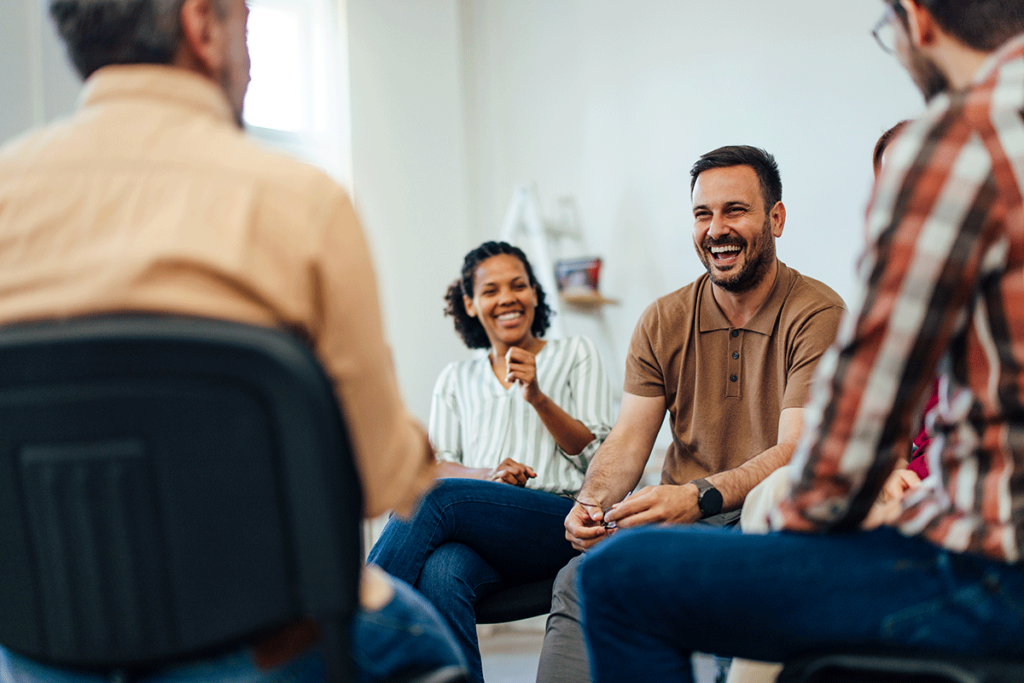Successful addiction recovery includes both individual and group therapy sessions where patients are free to open up and discuss their mental health. Participating in group therapy activities is an excellent way to build healthy coping skills, gain new friendships, and perfect communication and people skills. It will also increase people’s chances of resisting cravings and temptations, even if they reappear years after completing the recovery process.
At Outreach Recovery, we work with individuals who are struggling with addiction or other mental health conditions. Our programs are based on each individual’s unique symptoms and will include behavioral and holistic therapies and medical support to ease disruptive symptoms.
To see what group therapy activities we include in our treatment programs, reach us at 888.897.9284 to schedule a tour and meet our dedicated team.
What Is Group Therapy?
In movies, you may see a patient lying on the couch, confessing all their issues to a kind-looking therapist with a notepad and a cardigan sweater. Today’s therapy sessions give patients a more robust experience with adventure therapy, outdoor group discussions, music and art therapy, and animal-assisted therapy.
Activities for group therapy are very beneficial for those struggling with substance misuse, depression, post-traumatic stress disorder (PTSD), borderline personality disorder, and other treatable disorders.
Group therapy is an effective form of psychotherapy where a small group of individuals meets regularly to discuss and share their struggles. This safe environment enables patients to express their thoughts and feelings while also receiving support from others who understand what they are going through.
The Benefits of Group Therapy Activities
Just some of the benefits people can experience through group activities include:
- Improved social skills
- Gaining different perspectives from peers
- Better communication and listening skills
- Learning how to express empathy and compassion toward others
- Forming healthy peer relationships
- Increases self-esteem and confidence
Outreach Recovery includes a wide range of group therapy activities to build healthy bonds and practice and learn positive life skills. Our goal is to create a whole-person therapeutic approach so that patients can better understand their condition and develop personal coping skills to manage their symptoms and triggers.
10 Group Therapy Activities
Here are ten group therapy activities that can benefit the recovery process:
Role-Playing Games
This group therapy activity allows patients to see things from others’ perspectives and can be very eye-opening in terms of how others think and perceive them.
Group Discussions
Therapists supervise discussions between patients as they discuss a specific therapy topic or personal experiences with managing symptoms and triggers.
Trust Exercises
This group activity teaches patients how to place their trust in others and can help make it easier to build positive relationships and rely on others.
Mindfulness and Relaxation Techniques
Patients learn the benefits of being mindful of their surroundings and several relaxation techniques to keep them focused and calm. Deep breathing exercises and guided meditation are easy to do and come with many mental health benefits.
Art and Music Therapy
Creative self-expression is one therapeutic method patients can use to express how they feel. This is especially beneficial for those who have trouble verbalizing their feelings.
Problem-Solving Exercises
Therapists work closely with patients as they role-play complex situations and practice solving various problems calmly.
Life-Skills Training
Overcoming mental health conditions requires making several life changes. Group therapy is an excellent way to learn new skills like preparing healthy meals, daily journaling, and weekly exercise.
Goal Setting
Having specific goals is very important for the recovery process. Working with a group to achieve these goals is an excellent way to stay motivated and on track to reach those goals.
Peer Feedback and Support
Listening to peers talk about their personal experiences gives patients the chance to see how others are coping with similar problems. Their feedback can have a bigger impact as it comes from peer experiences rather than a therapist retelling a story of recovery.
Practice and Fine-Tune Coping Skills
This group activity gives patients the chance to practice their coping skills in a safe and supervised setting. Therapists will monitor their interactions and make suggestions to improve how they cope with the situation.
There are plenty of activities for group therapy that can benefit patient recovery and greatly improve their overall mental health. These activities teach patients healthy life skills and tailored coping skills that allow them to lead whole and productive lives.
Call Outreach Recovery to Learn About Group Therapy Activities
Outreach Recovery’s mental health treatment centers work with individuals who need help coping with depression, substance misuse, or other mental health conditions. We work closely with each patient to identify the underlying cause and build a comprehensive treatment program that includes private and group therapy sessions.
To discover the benefits of our group therapy activities, call 888.897.9284 today or reach out online.

